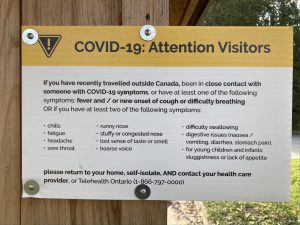Nov. 6, 2021 CBC News Second Opinion article: COVID-19 spreads through the air. Here’s what you can do about it this winter. “Canada is now an outlier in terms of not acknowledging transmission through the air.”
I was interested to read a recent CBC News Second Opinion article which notes that COVID-19 spreads through the air.
Heres’s an excerpt from a text by Adam Miller (I’ve omitted the embedded links which you can find in the original text):
Canadians looking for guidance on how to reduce their risk of COVID-19 indoors this winter may be feeling left out in the cold.
The Public Health Agency of Canada (PHAC) now recommends opening windows to increase ventilation and using HEPA filters to clean indoor air, but it stops short of advocating for better-quality masks or saying outright that the virus is primarily airborne.
“From what I’ve seen, Canada is now an outlier in terms of not acknowledging transmission through the air,” said Linsey Marr, an expert on virus transmission at Virginia Tech in Blacksburg, Va. “I think the messaging could be more clear.”
Canada’s guidelines on masking also haven’t been updated in more than a year, with non-medical masks containing a filter still recommended — despite research showing cloth masks are less effective than surgical masks against the airborne spread of COVID-19.
“It sounds like they’re still talking like there’s a shortage of medical masks,” said Marr, a civil and environmental engineering professor. “We know any mask is better than no mask, but also some masks are better than other masks — and so if you haven’t already, you could consider upgrading your mask.”
Marr said Canada is “missing out” on the opportunity to promote better protection from medical masks with higher filtration levels, such as surgical masks or N95s, but also when it comes to explaining exactly why filtration, ventilation and masking are so important.
“That’s because the virus is in the air,” she said. “I think if people understand that, they will be much more likely and willing to take measures that are effective at reducing transmission.”
Click here for previous posts about COVID-19 >
In Ontario, we can add, as of now there is no provincial mandate in place for vaccination of health-care workers.
On one level, we are in a situation where health science has barely a role to play at all, a state of provincial affairs where health science has flown out the window.
Language usage
Climate change is inseparable from the pandemic. A link that joins them both is language usage and the quality of reporting of the news.
A Nov. 6, 2021 CBC Science article is entitled: “5 ways to ignore the spin of climate politics and take away what matters: Politicians may pick and choose their facts, but experts have advice on how to hold them accountable.”
An excerpt reads:
Tip 1: Trust independent experts, not politicians
Taryn Fransen, an international climate policy expert and a senior fellow with the World Resources Institute, said her main advice is to pay attention to what independent climate analysts are saying.
“There are a lot of independent experts out there who will give you their unvarnished view about how ambitious the target is,” she said.
“All politicians want to paint their performance in the best possible light.”
Of related relevance:
A Nov. 5, 2021 Columbia Journalism Review article is entitled: “McClatchy to decline future Report for America participation, following hedge-fund critiques.”
An excerpt (I’ve omitted the embedded links; you can find them in the original text) reads:
IN JUNE, THE LOS ANGELES TIMES published an op-ed by Steven Waldman—the president and co-founder of Report for America (RFA), the journalism organization that pairs early-career journalists with news outlets that have identified critical gaps in their own coverage—titled “How to stop hedge funds from wrecking local news.” In the op-ed, Waldman writes that such investors, which own “half of the daily newspaper circulation in America,” have “a track record of cutting the reporting staff of local newsrooms to increase profits”; he also suggests policy proposals, including “improving antitrust enforcement,” to “confront” the damages done to local journalism by hedge funds, “head on.” Waldman has written and spoken critically about the perils of hedge-fund ownership on numerous occasions, even as Report for America has placed journalists in newsrooms owned by hedge funds. Now, it seems that one such news organization may have taken issue with those critiques.
Also of relevance, an Oct. 14, 2021 Atlantic article is entitled: “A SECRETIVE HEDGE FUND IS GUTTING NEWSROOMS: Inside Alden Global Capital.”
An excerpt reads:
Spend some time around the shell-shocked journalists at the Tribune these days, and you’ll hear the same question over and over: How did it come to this? On the surface, the answer might seem obvious. Craigslist killed the Classified section, Google and Facebook swallowed up the ad market, and a procession of hapless newspaper owners failed to adapt to the digital-media age, making obsolescence inevitable. This is the story we’ve been telling for decades about the dying local-news industry, and it’s not without truth. But what’s happening in Chicago is different.
In May, the Tribune was acquired by Alden Global Capital, a secretive hedge fund that has quickly, and with remarkable ease, become one of the largest newspaper operators in the country. The new owners did not fly to Chicago to address the staff, nor did they bother with paeans to the vital civic role of journalism. Instead, they gutted the place.


Leave a Reply
Want to join the discussion?Feel free to contribute!